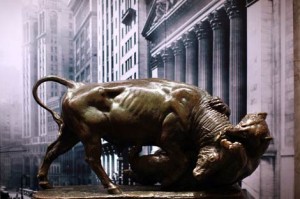
With the stock markets currently all over the place lately, there have been plenty of talks about recessions, bear markets, double dips, and tons of other financial vocabulary words that are thrown around.
But, what is the definition of a bear market? How do you define a recession? It may not be as easy as you think. You may actually not care either.
What Is The Definition Of A Recession?
While there are no clear cut definitions of a recession and no government agencies that host the one true, undisputedly accepted definition of a recession, most economists and financial planners agree upon one traditionally accepted definition of a recession. Most people now accept that two consecutive quarters of declining Gross Domestic Product (GDP) growth as the rule of thumb for the definition of a recession.
One of the tricky parts about this is that the U.S. Bureau of Economic Analysis (BEA) does not release quarterly GDP numbers for the United States until several months after the quarter has ended. So, technically, we could actually be in a recession currently without actually knowing it based on the definition of a recession.
What Is the Definition of a Bear Market?
Like the definition of a recession, there is no standard definition for a bear stock market either. Investors and stock traders tend to refer to the stock markets as either a bull market or a bear market. Many investors also tend to classify themselves as a bull or a bear as well depending on where they feel the stock market’s prices are heading in the future, either short-term or long-term.
A bear believes that prices will decline, and a bull believes that prices will rise. The markets received these nicknames because a bull tends to spear things with his horns thrusting them up and over his head. And, a bear tends to rake things in a downward motion with its claws.
Historically, a bear or a bull market has loosely been defined by 20% swings in the market. Now, this is not in one fell swoop but rather taken over a long period of time.
For example, the most recent bear market of 2008 is considered to have started on October 9th, 2007when the Dow Jones Industrial Average was 14,164. It then ultimately fell to 11,100 by July 11th, 2008 which is the 20% decline which defines a bear market in today’s sentiment.
Recession? Bear Market? Should You Care?
I understand that a lot of people are hurting out there. Unemployment continues to be at a recent high, credit card debt is rising, and the stock market continues to see down days of 100+ points.
But, should we care if we are in a recession again? Should we worry if this is another bear stock market? Most likely the answer is no. If you have decades away from needing the money that you have invested for retirement, for instance, then there is no reason to panic.
In fact, I look at the stock market’s recent declines as a buying opportunity. Those of us with years left to invest and save for retirement and other financial goals can wait for this current bear market out, scoop up good stocks that are cheap, and reap the rewards years down the road.
If you’re looking for places to keep traditional investment accounts, you might want to check out investing with Betterment or Stash Invest.
The newest robo-advisor on the market called M1 Finance gives the more established, sophisticated investors great investing options. M1 Finance simplifies the investment process for beginning and experienced investors alike. Unlike other robo-advisors, M1 Finance does not charge a fee, and it gives you the option of taking more control over your investments if you want them (and less if you don’t).

In the grand scheme of things, the past year or two end up just being noise. You need to take it one day at a time and enjoy life since today may be the last one anyway. Ignore the noise.
Thank you for clarifying the definitions of a recession and a bear market. You’re right–the media and everyone throws these terms around, but many of us (me included!) did not actually know the true definitions.
Also, definitely true about time horizon. I am not worried about our money in the markets because I have until 2045 when I retire. Right now, srocks are on sale.
Welcome to the Yakezie challenge!
I never knew the difference before, thanks for making it easier to understand, Hank. 🙂
Recession is nothing but our state of mind!!!